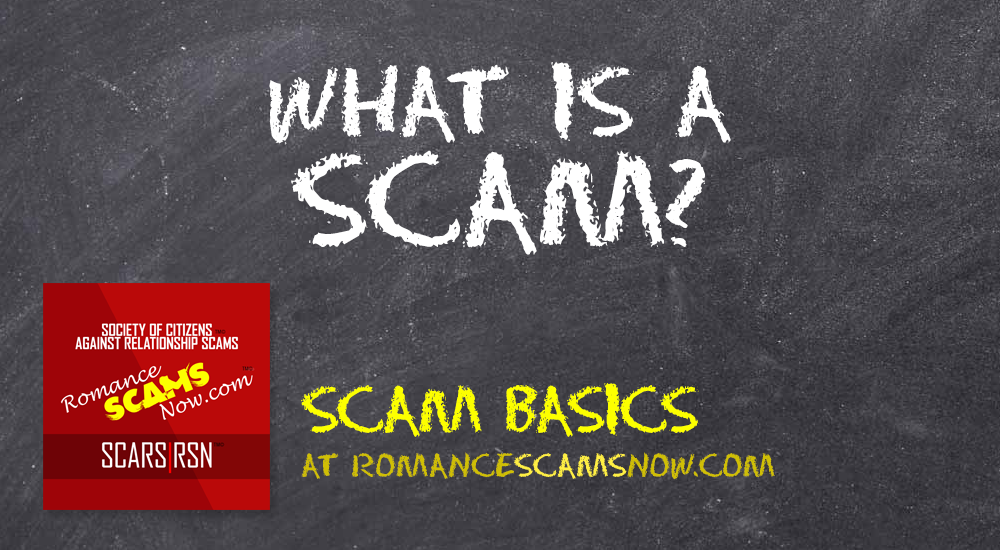SCARS™ Scam Basics: What Is A Scam?
You Would Think This Would Be Well Understood? But It’s Not!
What Is A Scam?
About half the people that we talk to think it is only a scam if they sent money to the scammer! A very large number of people who have been scammed, don’t think they were scammed.
So what is it?
SCAM
is a noun, and is pronounced: ˈskam
Definition of scam: a fraudulent or deceptive act or operation
That Is According To Merriam Webster.
Did You Notice That It Did Not Mention Money?
Synonyms of the word Scam: bunco (or bunko), con, flimflam, fraud, gyp, hustle, sting, swindle
According to the Business Dictionary:
A SCAM is a fraudulent scheme performed by a dishonest individual, group, or company in an attempt to obtain money or something else of value. Scams traditionally resided in confidence tricks, where an individual would misrepresent themselves as someone with skill or authority, i.e. a doctor, lawyer, investor. After the internet became widely used, new forms of scams emerged such as lottery scams, scam baiting, email spoofing, phishing, or request for help. These are considered to be email fraud.
Notice again that it says “an attempt to obtain money or something else of value”
Also, notice that THEY consider Scam Baiting to also be a fraud!
For those of you that think you were not scammed, the simple act of contacting you using a fraudulent name or identity for the purpose obtaining money or something else of value (namely your trust) is a SCAM.
In Reality, Even If You Only Engaged In A Conversation With A Scammer, And You Believed Their Story If Even For A Moment – Then You Were Scammed.
Another word for Scam is Bunco (Bun·co). Also called bun·ko (bŭng′kō). The plural is bun·cos also bun·kos. It is a swindle in which an unsuspecting person is cheated; a confidence game. In other words, they were bun·coed bun·koed or bun·ko·ing or bun·kos. It means to swindle. This term probably is an alteration of the Spanish “Banca” card game or “banco” which means bank.
Regardless, A Scam Is The Attempt To Cheat Or Swindle, Not The Success Of It
So stop thinking you were not scammed just because you did not lose money. You lost your trust, you time, and in most cases your heart to the scammer. And of course, for all too many their precious money.
You Were The Victim Of A Scam – Own It!
Now Move On To Becoming A Survivor!
PLEASE SHARE OUR ARTICLES WITH YOUR CONTACTS
HELP OTHERS STAY SAFE ONLINE
SCARS™ Team
A SCARS Division
Miami Florida U.S.A.
TAGS: Believe Their Story, Bunco, Bunko, Cheat, Con, Conversation With A Scammer, Definition, Scam, Swindle, What Is A Scam, You Were Scammed
END
MORE INFORMATION
– – –
Tell us about your experiences with Romance Scammers in our Scams Discussion Forum on Facebook »
– – –
FAQ: How Do You Properly Report Scammers?
It is essential that law enforcement knows about scams & scammers, even though there is nothing (in most cases) that they can do.
Always report scams involving money lost or where you received money to:
- Local Police – ask them to take an “informational” police report – say you need it for your insurance
- Your National Police or FBI (www.IC3.gov »)
- The SCARS|CDN™ Cybercriminal Data Network – Worldwide Reporting Network HERE » or on www.Anyscam.com »
This helps your government understand the problem, and allows law enforcement to add scammers on watch lists worldwide.
– – –
Visit our NEW Main SCARS Facebook page for much more information about scams and online crime: www.facebook.com/SCARS.News.And.Information »
To learn more about SCARS visit www.AgainstScams.org
Please be sure to report all scammers HERE » or on www.Anyscam.com »
Legal Notices:
All original content is Copyright © 1991 – 2020 SCARS All Rights Reserved Worldwide & Webwide. Third-party copyrights acknowledge.
SCARS, RSN, Romance Scams Now, SCARS|WORLDWIDE, SCARS|GLOBAL, SCARS, Society of Citizens Against Relationship Scams, Society of Citizens Against Romance Scams, SCARS|ANYSCAM, Project Anyscam, Anyscam, SCARS|GOFCH, GOFCH, SCARS|CHINA, SCARS|CDN, SCARS|UK, SCARS Cybercriminal Data Network, Cobalt Alert, Scam Victims Support Group, are all trademarks of Society of Citizens Against Relationship Scams Incorporated.
Contact the law firm for the Society of Citizens Against Relationship Scams Incorporated by email at legal@AgainstScams.org







I encounter somebody on Facebook who claims they want to start a business, Selling cellphones. They keep on asking me if I can give them my cellphone account ID and password so they can buy cellphones, have them shipped to my address and then send me payment for these phones. I do not trust this idea so I put this person off. Do you have other cases of this scam?
This is a very common scam
I have a question does tricking a person to obtain items of value count as a scam? And what does the victim do about that if the victim has the has tried to file police report but can’t due to not having all the correct Information on the thief scammer.?
As the post says, it is the “Intent” that makes it a scam. The police do not want to take reports because it affects their case closure rate. So you file an “Informational report” – tell them it is just for your insurance and taxes. Report the scammer through the SCARS network for distribution worldwide.